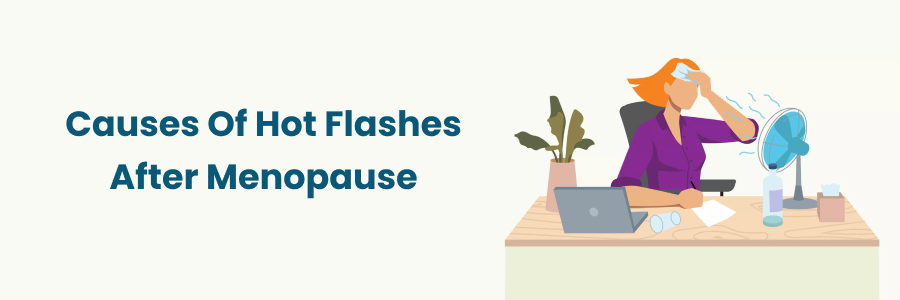- Cardiology 84
- Dermatology 45
- Endocrinology 33
- ENT 16
- Fertility 190
- Gastroenterology 78
- General-Medicine 81
- Gynecology 80
- Hematology 19
- Infectious-Diseases 33
- Neurology 52
- Oncology 34
- Ophthalmology 23
- Orthopedics 69
- Pediatrics 31
- Procedure 23
- Public-Health 144
- Pulmonology 59
- Radiology 8
- Urology 68
- Wellness 161
- Woman-and-child 77

Understanding the Causes of Hot Flashes After Menopause
Hot flashes are one of the most common symptoms women face during and after menopause. These sudden waves of heat can make life uncomfortable, affecting everything from daily routines to sleep. In this article, we'll look at the causes of hot flashes, especially after menopause, and provide tips for managing hot flashes during menopause.
What Are Hot Flashes
Hot flashes are sudden feelings of intense warmth, typically around the face, neck, and chest. They may be accompanied by sweating, a flushed appearance, or a rapid heartbeat. These symptoms can last from seconds to minutes and occur sporadically. Some women only experience them occasionally, while others have frequent episodes, even at night.
Secure your health with a second opinion. Make informed decisions and book your appointment today!
Get A Second OpinionCauses of Hot Flashes After Menopause
Hot flashes are primarily caused by hormonal shifts, but there are other reasons for hot flashes you should be aware of:
1. Hormonal Changes
The most significant menopause-related cause of hot flashes is a drop in estrogen levels. During menopause, your body produces much less estrogen and progesterone. This imbalance disrupts the body’s natural temperature regulation, leading to sudden waves of heat, also known as postmenopausal hot flashes.
2. Lifestyle Factors
Certain lifestyle habits can make hot flashes more frequent or intense. Here are a few that commonly contribute to managing menopause hot flashes:
- Diet: Spicy foods, caffeine, and alcohol can be triggers.
- Stress: High levels of stress can worsen the severity of hot flashes.
- Smoking: Smokers are more likely to experience intense hot flashes.
3. Medical Conditions
Several health conditions may also play a role in postmenopausal hot flashes causes:
- Thyroid problems: Hyperthyroidism, in particular, can mimic hot flashes.
- Infections: Infections that cause fever and sweating might be mistaken for hot flashes.
- Medications: Certain drugs, including antidepressants and pain relievers, may list hot flashes as a side effect.
4. Environmental Factors
External factors can also influence the severity of hot flashes:
- Hot weather: Warm environments and high humidity make hot flashes more likely.
- Tight clothing: Wearing heavy or tight clothing can trap heat and trigger a flash.
Managing Hot Flashes After Menopause
While understanding hot flashes after menopause is important, learning how to manage them can help improve your comfort and quality of life. Here are some practical strategies:
1. Lifestyle Changes
- Healthy diet: Cut down on caffeine, spicy foods, and alcohol to prevent triggering hot flashes.
- Exercise regularly: Light physical activities such as yoga or walking help regulate body temperature.
- Stress reduction: Use techniques like meditation or deep breathing to reduce stress, which can minimize hot flashes.
2. Medical Treatments
- Hormone Replacement Therapy (HRT): HRT is often recommended to rebalance hormones and relieve hot flashes. However, it's not suitable for everyone.
- Non-hormonal medications: Some medications, including certain antidepressants or anti-seizure drugs, may help reduce the frequency of hot flashes.
3. Alternative Therapies
- Herbal supplements: Supplements such as black cohosh, soy, and red clover are believed to help, but their effectiveness varies. Always consult with a healthcare provider before trying them.
- Acupuncture: Some women find relief from hot flashes through acupuncture treatments.
When to Seek Medical Advice
While managing hot flashes after menopause is often possible with lifestyle changes, there are times when you should seek medical attention:
- Severe hot flashes: If your hot flashes are unbearable and affecting your life, it's time to consult a doctor.
- Other symptoms: If you have other symptoms like weight loss or a rapid heartbeat, it could indicate an underlying condition.
- Long-lasting hot flashes: If you’re still experiencing frequent hot flashes several years after menopause, see a healthcare provider.
Ready to take control of your health journey? Book your appointment now and start your path towards wellness today!
Book an AppointmentConclusion
Hot flashes after menopause are a natural part of the aging process, but understanding their causes can help you manage them more effectively. By making some lifestyle changes and seeking appropriate treatments, you can reduce the frequency and intensity of postmenopausal hot flashes and improve your overall well-being.
If hot flashes are making life difficult, don't hesitate to seek advice from a healthcare professional to explore the right options for you.
Frequently Asked Questions
Hot flashes are primarily caused by hormonal changes related to menopause.
Decreased estrogen levels can disrupt the body's temperature regulation, causing hot flashes.
Yes, factors such as stress, caffeine, and spicy foods can trigger or worsen hot flashes.
Effective management strategies include hormone replacement therapy, lifestyle adjustments, and avoiding known triggers.
Medical advice should be sought if hot flashes are severe, persistent, or significantly impact quality of life.

- Cardiology 2132
- Dermatology 168
- Endocrinology 135
- ENT 97
- Fertility 217
- Gastroenterology 232
- General 478
- General-Medicine 1685
- Gynecology 169
- Hematology 85
- Infectious-Diseases 208
- Neurology 207
- Oncology 345
- Ophthalmology 65
- Orthopedics 187
- Pediatrics 83
- Procedure 72
- Public-Health 209
- Pulmonology 126
- Radiology 13
- Second Opinion 311
- Urology 294
- Wellness 600
- Woman-and-child 447
- Others 10217
Related Blogs
If you have any questions, please fill out the enquiry form or call us, and we will get back to you promptly.
040-68334455